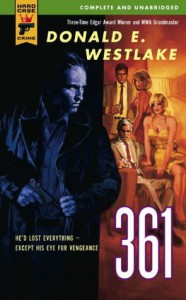
361 by Donald E. Westlake

After Raymond Kelley, a recently discharged Air Force soldier, witnesses the murder of his father and is horrifically maimed in the aftermath, he decides it’s time for paycheck. With only one word and a vague description of the murderer’s car to go on, Raymond and his brother quickly find themselves waist-deep in a web of danger, deceit, and mobsters. Little do the brothers know that they’re being hunted, too…
361 is, without a shadow of a doubt, the quintessential hard boiled crime novel. Westlake’s writing exemplifies the stylized grit and action-packed drama of the genre, almost to a fault. Between the endless comma splicing and endless descriptions of everything Raymond finds remotely interesting, it’s clear that the meat of the book lies in its style more so than its story. Yet even so, Westlake’s narrative never loses its quick pace nor does it ever delve into pointless sleaze like many other pulpy crime stories of the time. The greatest strength of his writing, however, is the characters. Westlake is a master at throwing flawed individuals into an impossible situation without sacrificing their likability. Everyone feels realistic at the end of the day, which is a rare find in an otherwise pulpy outing.
While the short standalone novel sometimes flirts with interesting themes, such as regret and old age, it never does deeper than the occasional subtext. Westlake’s ideas on what the post-Prohibition mob scene was like is also quaint in hindsight, as history has since shown us that the real-world Mafia didn’t simply fall apart after the legalization of booze. The problem's not on Westlake, though—it’s not his fault the book was published a year before Joseph Valachi’s tell-all testimony as the first mob informant for the FBI. Considering how badly most stories from the 60s age, inaccurate gangster representation is far from the worst sin such a book can commit.
On a side note, the Kindle port is lazy. The first 3% of the kindle edition contains an excerpt from the beginning of the book, so the reader might end up reading it twice if they don’t realize what they’re looking at.

















